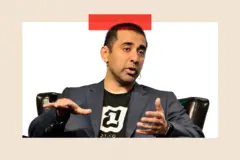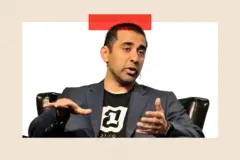Imagine being able to choose your citizenship like you choose your gym membership. This is the vision put forward by Balaji Srinivasan, a tech entrepreneur and former partner at Andreessen Horowitz. Balaji, known for his rockstar status in the crypto world, believes that technology can do everything governments currently do, but better.
The Concept of Network States
Balaji outlined his idea at a conference in Amsterdam, asking: ‘We start new companies like Google; we start new communities like Facebook; we start new currencies like Bitcoin and Ethereum; can we start new countries?’ He calls this concept the ‘network state’ – essentially startup nations that exist alongside traditional countries.
The process would involve communities forming online around shared interests or values, then acquiring land to become physical ‘countries’ with their own laws. Citizens would choose their nationality like they choose their broadband provider. This idea is not entirely new; corporations have had significant influence over nation-states in the past. However, the network state movement aims to replace governments with companies altogether.
Existing Examples and Controversies
Some elements of the network state already exist. For example, Cabin is a ‘network city of modern villages’ with branches in the US, Portugal, and elsewhere. Culdesac is an Arizona-based community designed for remote working. Próspera, located on an island off Honduras, describes itself as a ‘private city’ catering to entrepreneurs and has been granted special status to make its own laws.

Critics view the network state idea as a neo-colonial project that would replace elected leaders with corporate dictators. The movement includes figures associated with the ‘alt-right’ and controversial ideas. For instance, Curtis Yarvin, a figure from the ‘Dark Enlightenment,’ advocates for a totalitarian future ruled by corporate ‘monarchs.’
Praxis: A New City-State on the Horizon?
At the Amsterdam conference, Dryden Brown presented his project, Praxis – a new city-state to be governed on the blockchain. He claimed it would be backed by funds with access to hundreds of billions of dollars. The Praxis community currently exists mainly online, with a website where you can apply for citizenship. The project’s reputation for edginess and hosting ‘legendary parties’ raised eyebrows.

Attendees at a Praxis magazine launch party in Manhattan included individuals with backgrounds in cryptocurrency and tech. Some expressed enthusiasm for the idea of corporate dictators or ‘philosopher kings’ ruling new network states. Critics at the party questioned the feasibility and ethics of starting entire cities without government oversight.
The Future of Network States
The network state movement is gaining traction, with various projects underway. Whether these will become the future of governance or remain a niche tech bro fantasy remains to be seen. As concerns about democracy and traditional nation-states grow, the network state concept is poised to be a significant development to watch.
The BBC InDepth analysis explores the intersection of technology, politics, and society, offering fresh perspectives on complex issues. For more thought-provoking content, visit the BBC InDepth page on the BBC website or app.


